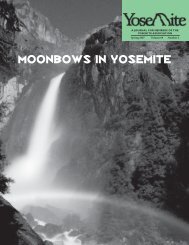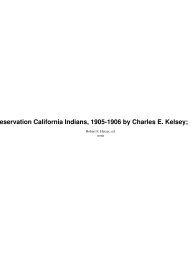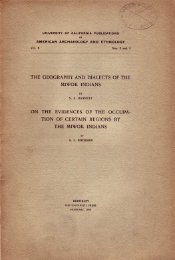Restoring a Bridge to the Past - Yosemite Online
Restoring a Bridge to the Past - Yosemite Online
Restoring a Bridge to the Past - Yosemite Online
You also want an ePaper? Increase the reach of your titles
YUMPU automatically turns print PDFs into web optimized ePapers that Google loves.
C E L E B R A T I N G W I L D E R N E S S<br />
I N 2 0 0 4<br />
Wilderness preservation is an American invention—a<br />
unique contribution of our nation<br />
<strong>to</strong> world civilization. As we mark <strong>the</strong> 40 th<br />
anniversary of <strong>the</strong> Wilderness Act (September 3, l964),<br />
Americans should renew <strong>the</strong>ir pride in and commitment<br />
<strong>to</strong> <strong>the</strong> National Wilderness Preservation System. It is one<br />
of <strong>the</strong> best ideas our country ever had.<br />
One place <strong>to</strong> start <strong>the</strong> celebration is with <strong>the</strong> recognition<br />
that wilderness is <strong>the</strong> basic component of American<br />
culture. From its raw materials we built a civilization.<br />
With <strong>the</strong> idea of wilderness we sought <strong>to</strong> give that civilization<br />
identity and meaning. Our early environmental<br />
his<strong>to</strong>ry is inextricably tied <strong>to</strong> wild country. Hate it or love<br />
it, if you want <strong>to</strong> understand American his<strong>to</strong>ry <strong>the</strong>re is<br />
no escaping <strong>the</strong> need <strong>to</strong> come <strong>to</strong> terms with our wilderness<br />
past. From this perspective, designated Wilderness<br />
Areas are his<strong>to</strong>rical documents; destroying <strong>the</strong>m is comparable<br />
<strong>to</strong> tearing pages from our books and laws. We<br />
cannot teach our children what is special about our his<strong>to</strong>ry<br />
on freeways or in shopping malls. As a professional<br />
his<strong>to</strong>rian I deeply believe that <strong>the</strong> present owes <strong>the</strong> future<br />
a chance <strong>to</strong> know its wilderness past. Protecting <strong>the</strong> remnants<br />
of wild country left <strong>to</strong>day is an action that defines<br />
our nation. Take away wilderness and you diminish <strong>the</strong><br />
opportunity <strong>to</strong> be American.<br />
Of course our nation changed its initial wilderness<br />
environment. Early on we eliminated a lot of wild places<br />
along with <strong>the</strong> wild people who were <strong>the</strong>re before us. But<br />
in this process of pioneering we also changed ourselves.<br />
In time Americans began <strong>to</strong> understand that <strong>the</strong> conquest<br />
of <strong>the</strong> wilderness could go <strong>to</strong>o far for our own good. Now,<br />
many think, it is time <strong>to</strong> conquer a civilization no<strong>to</strong>rious<br />
for its excesses. Unrestrained growth can be ironic;<br />
bigger is not better if <strong>the</strong> support systems are compromised.<br />
Wilderness is an anchor <strong>to</strong> windward in <strong>the</strong> seas of<br />
increasingly frightening environmental change.<br />
The intellectual revolution that changed our attitude<br />
<strong>to</strong>ward wilderness from a liability <strong>to</strong> an asset is<br />
one of <strong>the</strong> most profound in environmental his<strong>to</strong>ry. In<br />
<strong>the</strong> beginning of <strong>the</strong> American experience wilderness<br />
was “howling”: feared and hated by European colonists<br />
who longed <strong>to</strong> bring order and security <strong>to</strong> uncontrolled<br />
nature. Their religious heritage taught <strong>the</strong>m that God<br />
cursed wild places; <strong>the</strong> civilizing process was a blessing.<br />
Only gradually and incompletely did <strong>the</strong>se old conquerand-dominate<br />
biases give way first <strong>to</strong> wilderness appreciation<br />
and <strong>the</strong>n <strong>to</strong> preservation.<br />
10 Y O S E M I T E A S S O C I A T I O N , F A L L 2 0 0 4<br />
BY RODERICK FRAZIER NASH<br />
Romanticism, with its delight in awesome scenery<br />
and noble savages, underlay changing attitudes. So did<br />
<strong>the</strong> concept that wilderness was <strong>the</strong> source of a unique<br />
American art, character and culture. The Adirondacks<br />
and <strong>the</strong> Grand Canyon were <strong>the</strong> American equivalent<br />
of <strong>the</strong> Acropolis and Buckingham Palace. By <strong>the</strong> l850s<br />
Henry David Thoreau could celebrate <strong>the</strong> physical and<br />
intellectual vigor of <strong>the</strong> wild as a necessary counterpoint<br />
<strong>to</strong> an effete and stale civilization. He called for people<br />
and landscapes that were “half cultivated.” He realized<br />
that saving some wilderness from development would<br />
help keep <strong>the</strong> New World new.<br />
Granted, few paused <strong>to</strong> read Thoreau’s essays at<br />
<strong>the</strong> height of westward expansion, but a half century<br />
brought significant physical and intellectual changes<br />
in <strong>the</strong> United States. Discontent with urban environments,<br />
and <strong>the</strong> perception that <strong>the</strong> frontier was vanishing,<br />
brought new popularity <strong>to</strong> wilderness. National<br />
parks (notably Yellows<strong>to</strong>ne, <strong>the</strong> world’s first in l872, and<br />
<strong>Yosemite</strong>, l890) began a policy of protecting unmodified<br />
public land for its scientific, scenic and recreational values.<br />
John Muir organized <strong>the</strong> Sierra Club <strong>to</strong> defend <strong>the</strong><br />
parks in l892 and rallied <strong>the</strong> nation around <strong>the</strong> idea that<br />
wilderness was a valuable component of a diverse and<br />
strong civilization. In <strong>the</strong> early 20th century Theodore<br />
Roosevelt’s conservation movement included concern<br />
for protection of big wild country in which pioneer<br />
skills, such as hunting and camping, had meaning. By<br />
<strong>the</strong> 1920s <strong>the</strong> United States Forest Service was giving<br />
administrative recognition <strong>to</strong> large roadless areas of<br />
<strong>the</strong> national forests. Simultaneously, <strong>the</strong> growing science<br />
of ecology called importance <strong>to</strong> wildernesses as<br />
reservoirs of basic biological and physical processes.<br />
Understandably, Aldo Leopold, a forest ecologist, led <strong>the</strong><br />
way in calling for wilderness preservation and defining<br />
an ethical, not merely an economic, relationship <strong>to</strong> land.<br />
What was new about <strong>the</strong> Wilderness Act of l964 was<br />
<strong>the</strong> way it gave specific, systematic and secure protection<br />
<strong>to</strong> wilderness qualities and <strong>the</strong> wilderness experience.<br />
The law spoke about <strong>the</strong> importance of securing “an<br />
enduring resource of wilderness” for <strong>the</strong> American people.<br />
The language itself was revolutionary. Traditionally<br />
Americans reserved <strong>the</strong> term “resource” or “natural<br />
resource” for hard-core economic stuff like lumber, oil,<br />
soil, minerals and hydropower. In describing wilderness<br />
as a “resource,” Howard Zahniser, who wrote most of <strong>the</strong><br />
Act, and Congress enlarged <strong>the</strong> definition of that term <strong>to</strong>



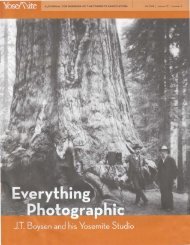
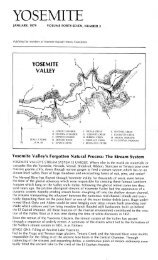
![(March 1982) [PDF] “We Are Pleased to Announce†- Yosemite Online](https://img.yumpu.com/51299748/1/190x242/march-1982-pdf-aeuroewe-are-pleased-to-announceaeur-yosemite-online.jpg?quality=85)
![[PDF] Old Horny, Yosemite's Unicorn Buck - Yosemite Online](https://img.yumpu.com/51269869/1/184x260/pdf-old-horny-yosemites-unicorn-buck-yosemite-online.jpg?quality=85)
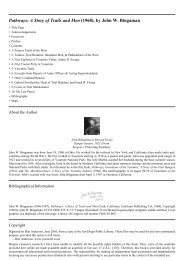
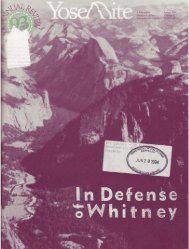
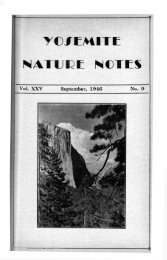
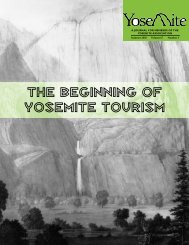
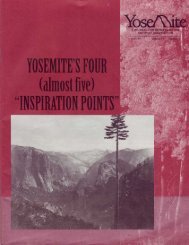
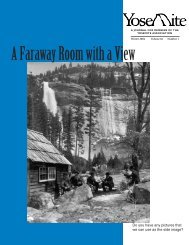
![1985 [PDF] - Yosemite](https://img.yumpu.com/48128837/1/184x260/1985-pdf-yosemite.jpg?quality=85)
